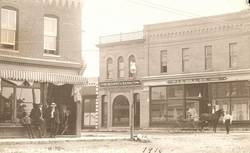1882 - Present
The First Settlers
Sam Long and John Fee were the first European settlers in the Hartney area. Early in 1881, they made their way from Portage La Prairie to settle in what would be the Melgund district. They built a sod shack and set about breaking sod and putting up hay. While they went to Winnipeg and Brandon to work for the winter their shack became crowded as more settlers arrived in the area and moved into the only existing shelter. Before spring 1882 the small building was the temporary home of 17 people.

James Hartney
James Hartney's interest in the area began later in 1881. He bought two sections of land and hired labourers to work it before he moved to the area in 1882 with his family. He imported a carload of Red Fife wheat from Minnesota and after reserving enough for his own crops sold the rest to his neighbours. By 1882 he had a good wheat crop, thus beginning the district's reputation as a first-class wheat producing area. His success attracted more settlers and Hartney's farm became the centre of a new community. He was soon granted the right to open a post office which he named after himself. He also set up a store, first operated out of his home and later in a separate building. He brought men into the community to operate this business as well as a blacksmith shop that he later established.
Settlement
By 1884, settlement was well under way and families began moving into the area, joining fathers and husbands already established. Rough shanties were added on to or replaced by framed structures. In these early years people gathered on Sundays in their homes for Bible readings and hymn singing. As settlement increased, these gatherings became denominational and were held in the school.
When the Canadian Pacific Railway (CPR) survey was made in 1889, a station named “Airdrie” (after a town in Scotland) was established on the section to the north of James Hartney's homestead. The community centre that had grown around Hartney's farm shifted a half-mile to this new townsite where the road running parallel to the railway became the main street.
Hartney's first school was outside of town and named Webb after the person who owned the land the building was on. Children walked to and from school, some having to cross the Souris River regularly. The Magwood children crossed the river in a rowboat before having to walk a further two miles to school every day. Children living in town would meet the teacher, Mr. Forrester, in town and walk to school with him. In 1892 school activities moved into town after a classroom was opened above the newly built implement and lumber store. In January of 1898 the school district's name was changed from Webb to Hartney.
Collecting Firewood
During the winter when farmers were not busy on the fields, trips to Turtle Mountain to collect firewood occurred regularly. The trip began at four in the morning and a full day of driving was put in to cover the 40 miles (64 kms) to Turtle Mountain before camp could be struck. The next day the horses rested while the men cut wood and loaded it onto sleighs. On the third day, the trip home began long before sunrise with a home arrival time between eight and eleven o'clock, depending on road conditions and weather.
Growth and Prosperity
With time, the town grew and flourished, changing its name from Airdrie to Hartney and adding a second railway, the Canadian Northern, in 1900. By 1904, in addition to being the home of eight operating elevators and 10 clergy members, 51 businesses were listed in the town newspaper.
For More Information: http://hartney.ca
. . . . .
Author: Teyana Neufeld
Sources:
Hartney and District Historical Committee. A Century of Living. Steinbach; Derksen Printers, 1982.
Jasper, Naomi. "A Century of Living." Hartney and District Historical Committee 1.
Time Links. "Hartney." 1997. Manitoba Historical Society. 19 Nov. 2008. http://www.mhs.mb.ca/docs/features/timelinks/communit/hartney.htm
Witt, Irene. "Hartney Public School District No. 512." Hartney and District Historical Committee 97-98.
Links:
